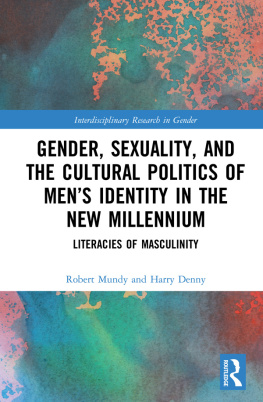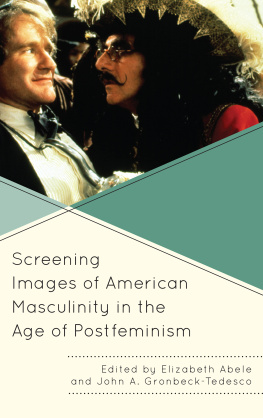MASCULINITY IN CONTEMPORARY QUALITY TELEVISION
The Cultural Politics of Media and Popular Culture
Series editor:
C. Richard King
Washington State University, USA
Dedicated to a renewed engagement with culture, this series fosters critical, contextual analyses and cross-disciplinary examinations of popular culture as a site of cultural politics. It welcomes theoretically grounded and critically engaged accounts of the politics of contemporary popular culture and the popular dimensions of cultural politics. Without being aligned to a specific theoretical or methodological approach, The Cultural Politics of Media and Popular Culture publishes monographs and edited collections that promote dialogues on central subjects, such as representation, identity, power, consumption, citizenship, desire and difference.
Offering approachable and insightful analyses that complicate race, class, gender, sexuality, (dis)ability and nation across various sites of production and consumption, including film, television, music, advertising, sport, fashion, food, youth, subcultures and new media, The Cultural Politics of Media and Popular Culture welcomes work that explores the importance of text, context and subtext as these relate to the ways in which popular culture works alongside hegemony.
Also available in this series:
Disability and Popular Culture
Focusing Passion, Creating Community and Expressing Defiance
Katie Ellis
ISBN: 978-1-4724-1178-5
Beyond Hate
White Power and Popular Culture
C. Richard King and David J. Leonard
ISBN: 978-1-4724-2746-5
The American Imperial Gothic
Popular Culture, Empire, Violence
Johan Hglund
ISBN: 978-1-4094-4954-6
Representations of HIV/AIDS in Contemporary Hispano-American and Caribbean Culture
Cuerpos suiSIDAs
Gustavo Subero
ISBN: 978-1-4724-2595-9
Masculinity in Contemporary Quality Television
MICHAEL MARIO ALBRECHT
Eckerd College, USA
First published 2015 by Ashgate Publishing
Published 2016 by Routledge
2 Park Square, Milton Park, Abingdon, Oxon OX14 4RN
711 Third Avenue, New York, NY 10017, USA
Routledge is an imprint of the Taylor & Francis Group, an informa business
Copyright Michael Mario Albrecht 2015
Michael Mario Albrecht has asserted his right under the Copyright, Designs and Patents Act, 1988, to be identified as the author of this work.
All rights reserved. No part of this book may be reprinted or reproduced or utilised in any form or by any electronic, mechanical, or other means, now known or hereafter invented, including photocopying and recording, or in any information storage or retrieval system, without permission in writing from the publishers.
Notice:
Product or corporate names may be trademarks or registered trademarks, and are used only for identification and explanation without intent to infringe.
British Library Cataloguing in Publication Data
A catalogue record for this book is available from the British Library.
The Library of Congress has cataloged the printed edition as follows:
Albrecht, Michael Mario.
Masculinity in contemporary quality television / by Michael Mario Albrecht.
1 online resource. (The cultural politics of media and popular culture)
Includes bibliographical references and index.
Description based on print version record and CIP data provided by publisher; resource not viewed.
ISBN 978-1-4094-6972-8 (hardback : alk. paper) ISBN 978-1-3155-9417-0 (ebook PDF) ISBN 978-1-3170-9981-9 (epub)
1. Masculinity on television.
2. Men on television. 3. Television programsUnited StatesHistory21st century. I. Title.
PN1992.8.M38
791.4565211--dc23
2014039922
ISBN 9781409469728 (hbk)
ISBN 9781315594170 (ebk-PDF)
ISBN 9781317099819 (ebk-ePUB)
Contents
Preface and Acknowledgments
This book came about rather serendipitously. I was set to present a paper about Breaking Bad and masculinity at the Popular Culture Association conference in Boston in 2012. Karen Pitcher Christiansen was presenting a paper about Californication and masculinity at the conference, which was part of a project that she had developed at Eckerd College with undergraduate Nathaniel Davis, and I thought that my Breaking Bad paper would complement their work nicely. We were both accepted, and I was looking forward to the PCA conference. Unfortunately, I had to have major surgery and was unable to attend the conference or even to write the paper; I only had a short abstract. After the conference, Neil Jordan, the commissioning editor for this book, approached me about the paper that I had not written, and he ultimately saw enough promise in the project to work with me on this book. I would like to thank Karen and Nathaniel exuberantly for providing the germ of inspiration for me to embark upon this project, and to thank Neil profusely for his enthusiasm with my project and patience as it took a bit longer than he had hoped.
I am deeply indebted to a wealth of scholars, colleagues, friends, and students whom I have met in my stints at Eckerd College, The University of New Hampshire, The University of Wisconsin-Milwaukee, The University of Iowa, Bowling Green State University, Macalester College, and beyond. Mark Andrejevic, Matthew Ascah, Caitlin Bruce, Megan Foley, Charles Goehring, Krissy Gordon, Bruce Gronbeck, Heather Hayes, David Heineman, Dena Huisman, James Janack, Sangeet Kumar, Elana Levine, Kembrew McLeod, Jennifer Musial, Michael Newman, Christina Petersen, Peter Schaefer, Margaret Schwartz, Claire Sisco King, and Zack Stiegler are among the myriad people who have inspired, conversed, edited, and advised as I have developed this project. I am humbled to know such smart, kind, and generous folks. I would particularly like to thank Leslie Hahner, Paul Johnson, Karen Pitcher Christiansen, and Melissa Zimdars who graciously took the time to read large portions of this project, and offer encouragement, feedback, and critique. Without their generosity and scholarly rigor, the completion of this project would not have been possible. Finally, Id like to thank my parents who have supported me, encouraged me, and delivered me a Boodles as I was starting a new faculty position, enduring several moves, and undergoing multiple surgeriesall of which happened while I was writing this book.
Michael Mario Albrecht
Introduction
In the third season premiere of the Showtime comedy Californication (20072014), Richard Bates, a minor character in the show, gets drunk at a dinner party and emerges from the bathroom fully nude, and performs the pee-pee dance (Wish You Were Here). The dance features the drunk and nude Bates tucking his genitalia between his legs to display a mangina, a neologism used to describe the way the tucked genitals resemble a female pubic region but reside on a male body. Batess performance resonates with a set of twenty-first century discourses that posit the concept of masculinity as engaging with a crisis of gender. Bates is a new man who is ostensibly comfortable in his sexuality and exploring a more primal version of masculinity than one usually acceptable for a dinner party. He is not afraid to explore his feminine side, or his childlike side as he hides one of the markers of dominant adult masculinity and uses language associated with a pre-pubescent child. However, the show presents Bates as a drunken fool who is unable to perform a version of sexuality that is legible or acceptable to the others at the dinner party. Never a show to rely on subtlety,






